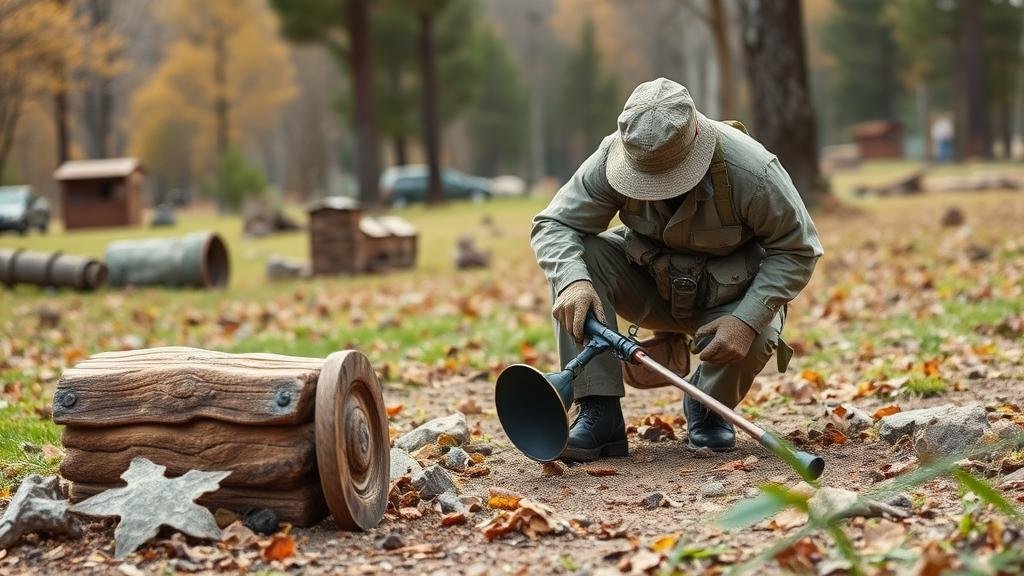Metal Detecting Along Military Campgrounds for Historical Relics
Metal Detecting Along Military Campgrounds for Historical Relics
Metal detecting is a compelling hobby that allows enthusiasts to uncover historical artifacts–especially in locations with rich military histories, such as old military campgrounds. These sites were once bustling with activity, and the likelihood of finding relics that reveal stories from the past is significant. This article will delve into the nuances of metal detecting along military campgrounds, covering legal considerations, techniques, and the historical context of findings.
Understanding the Legal Landscape
Before embarking on a metal detecting adventure, its crucial to understand the legal ramifications. Not all military campgrounds permit metal detecting, and regulations can vary significantly depending on the location.
- Always check federal and state laws regarding metal detecting on public lands.
- Obtain written permission when detecting on private properties or historical parks.
- Familiarize yourself with local ordinances which may restrict activities in certain areas.
For example, the Archaeological Resources Protection Act (ARPA) of 1979 establishes strict penalties for unauthorized excavation or collection of artifacts on federal lands. So, being informed is not just a guideline; it is a necessity.
Identifying Promising Locations
Choosing the right location significantly enhances the chances of finding historical relics. Military campgrounds, especially those used during major conflicts like the Civil War, World War I, or World War II, are veritable treasure troves of history.
- Research historical maps and documents to identify locations of former encampments.
- Look for locations with high military activity, such as training grounds or supply depots.
- Use online resources and databases that catalogue military historical sites.
A classic example is the use of metal detecting at Gettysburg National Military Park, where numerous artifacts have been unearthed that shed light on Civil War battles. But, detecting here requires diligent adherence to park rules, as the park is a protected site.
Techniques for Effective Metal Detecting
Once you have your location, the next step is to apply the right metal detecting techniques. The effectiveness of metal detecting can depend on various factors, including equipment settings, soil conditions, and search patterns.
- Equipment: Invest in quality detectors equipped with discrimination settings that allow the differentiation between junk metal and desired relics.
- Search Patterns: Employ systematic patterns, such as a grid or a spiral search, to maximize coverage of the area.
- Ground Conditions: Adjust settings based on wet or dry soil, as moisture levels can affect signal strength.
For example, employing a grid pattern ensures that no area is overlooked, while a discrimination feature can help avoid digging up modern artifacts that may clutter a site.
Possible Finds and Their Histories
Metal detecting can yield an array of artifacts, from military uniform buttons to entire weapons or tools used by soldiers. Understanding the significance of these finds adds context to the hobby.
- Uniform Buttons: Often stamped with regimental insignia, these items can provide insights into the units stationed at a particular campsite.
- Musket Balls: Commonly found in Civil War sites, these projectiles often carry historical messages about the lifestyle of soldiers during that era.
- Personal Items: Spectacles, letters, or even ID tags offer intimate glimpses into the lives of individual soldiers.
For example, in Palmetto Ranch, Texas, artifacts such as dog tags and buttons were recovered, offering insights into the lives of military personnel during the period. Each find serves to detail the personal history that encompasses broader historical narratives.
Preservation and Reporting of Finds
Upon discovering historical relics, preservation becomes the next critical concern. Artifacts should be cleaned properly and handled minimally to maintain their integrity.
- Use soft brushes and distilled water to clean metal objects. Avoid harsh chemicals that may corrode the metal.
- Store items in appropriate conditions–dry, dark places to prevent deterioration.
- Consider reporting significant finds to local historical societies or museums, contributing to public knowledge and preservation efforts.
Engaging with museums can lead to opportunities for further research and even shared exhibitions featuring your findings.
Conclusion and Actionable Takeaways
Metal detecting in military campgrounds is not just a rewarding pastime; it serves as a path to historical discovery and preservation. By being vigilant about legal requirements, employing effective techniques, understanding the artifacts, and ensuring their preservation, metal detectors can uncover histories that would otherwise remain buried.
- Research the legality of metal detecting in your chosen area.
- Effectively choose sites based on historical significance.
- Adopt best practices in metal detecting techniques for optimal results.
- Preserve and, if necessary, report significant finds to promote historical scholarship.
In summary, the endeavor of metal detecting along military campgrounds is as much an exploration of history as it is a thrilling hobby. Those who undertake this pursuit diligently and responsibly contribute significantly to the understanding of our shared military past.


